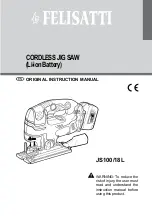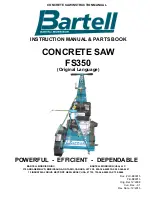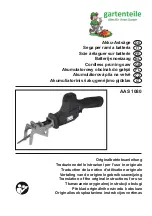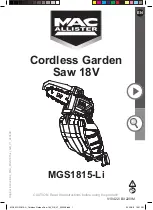
16
Sliding mitre saw
3855
INTRODUCTION
• This tool is intended as a stationary machine for
lengthways and crossways cutting of wood with straight
cuts as well as angle cuts (horizontal mitre angles of -47°
to +47° as well as vertical bevel angles of 0° to 45° are
possible)
• Read and save this instruction manual
2
• The sequence of the numbers appearing in the
separate
assembly instruction sheet corresponds
with the sequence of the steps to be followed for
assembling the tool
•
Only use the tool when correctly and completely
assembled
(be aware that Skil cannot be hold
responsible for tool damage and/or personal injuries
resulting from the incorrect assembly of the tool)
• Before using the tool for the first time, paste the supplied
sticker in your national language over the English text of
warning label A
5
TECHNICAL SPECIFICATIONS
1
TOOL ELEMENTS
5
A
Warning label
B
Switch handle
C
Locking pin for transport
D
Safety lever
E
Transport handle
F
Mounting holes
G
Support foot
H
Dust bag
J
Extension bars
J1
Knobs for locking extension bars
K
Clamp for mounting workpiece
L
Fence
M
Locking handle (mitre angles)
M1
Mitre angle indicator
N
Locking knob (bevel angles)
N1
Bevel angle indicator
P
Laser light
P1
On/off switch laser
Q
Spot light
Q1
Switch for spot light
R
Locking knob for slide device
S
On/off switch
T1
Cutting depth limiter
T2
Depth stop
V
Length stop
W
Hex key
W1
Storage for hex key
W2
Spindle-lock button
W4
Lower guard
W6
Upper guard
X
Table insert
Y
Cable storage hook
SAFETY
GENERAL SAFETY INSTRUCTIONS
WARNING! Read all safety warnings and all
instructions.
Failure to follow the warnings and instructions
may result in electric shock, fire and/or serious injury.
Save all
warnings and instructions for future reference.
The term
“power tool” in the warnings refers to your mains-operated
(corded) power tool or battery-operated (cordless) power tool.
1) WORK AREA SAFETY
a)
Keep work area clean and well lit.
Cluttered or dark
areas invite accidents.
b)
Do not operate power tools in explosive
atmospheres, such as in the presence of flammable
liquids, gases or dust.
Power tools create sparks which
may ignite the dust or fumes.
c)
Keep children and bystanders away while operating
a power tool.
Distractions can cause you to lose control.
2) ELECTRICAL SAFETY
a)
Power tool plugs must match the outlet. Never
modify the plug in any way. Do not use any adapter
plugs with earthed (grounded) power tools.
Unmodified plugs and matching outlets will reduce risk of
electric shock.
b)
Avoid body contact with earthed or grounded
surfaces such as pipes, radiators, ranges and
refrigerators.
There is an increased risk of electric
shock if your body is earthed or grounded.
c)
Do not expose power tools to rain or wet conditions.
Water entering a power tool will increase the risk of
electric shock.
d)
Do not abuse the cord. Never use the cord for
carrying, pulling or unplugging the power tool. Keep
cord away from heat, oil, sharp edges or moving
parts.
Damaged or entangled cords increase the risk of
electric shock.
e)
When operating a power tool outdoors, use an
extension cord suitable for outdoor use.
Use of a cord
suitable for outdoor use reduces the risk of electric shock.
f)
If operating a power tool in a damp location is
unavoidable, use an earth leakage circuit breaker.
Use of an earth leakage circuit breaker reduces the risk
of electric shock.
3) PERSONAL SAFETY
a)
Stay alert, watch what you are doing and use
common sense when operating a power tool. Do not
use a power tool while you are tired or under the
influence of drugs, alcohol or medication.
A moment
of inattention while operating power tools may result in
serious personal injury.
b)
Use personal protective equipment. Always wear
eye protection.
Protective equipment such as dust
mask, non-skid safety shoes, hard hat, or hearing
protection used for appropriate conditions will reduce
personal injuries.
c)
Prevent unintentional starting. Ensure the switch is
in the off-position before connecting to power
source and/or battery pack, picking up or carrying
the tool.
Carrying power tools with your finger on the
switch or energising power tools that have the switch on
invites accidents.
Summary of Contents for Masters 3855
Page 3: ...3 P1 Q1 D B E T2 A N R K H W6 S W W1 J J F F X G L V M J1 J1 W4 M1 T1 5a...
Page 4: ...4 C 90 W2 C Y N1 P Q 5b 6...
Page 5: ...5 NOT INCLUDED F G NOT INCLUDED 7a 7b...
Page 6: ...6 H 35 mm 8 J1 J 9 K1 K2 L K3 K4 K4 K5 K6 0a 0b...
Page 8: ...8 0 45 N N1 0 45 0 45 45...
Page 10: ...10 a D S B R b...
Page 11: ...11 R T1 T2 T3 V V1...
Page 12: ...12 W3 W5 W4 W W3 W4 360 W2 W W1 W6 a b c d e f...
Page 13: ...13 5x N2 N1 NOT INCLUDED 4 mm NOT INCLUDED 0 N...
Page 14: ...14 L1 L1 L1 L1 L W 45 N3 N1 NOT INCLUDED 4 mm NOT INCLUDED N...
Page 15: ...15...





































